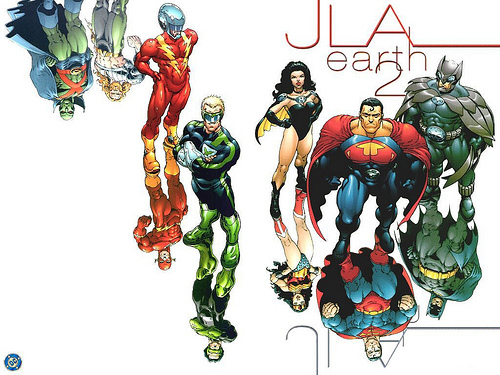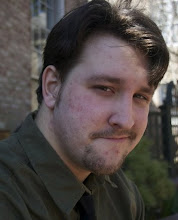I will start off by saying that this is actually something I want replies/feedback on.
The idea spawned this morning while I was mulling over the various responses to Star Trek: Into Darkness. So many people have divided opinions on the execution of this latest film, something which in my observation has been viewed by fans as "not true to the originals", or "just not as good". I wanted to spark some discussion about why people either dislike the specific rules that are being constructed in this new Star Trek, which is no different than Ultimate Comics' tweaks of the Marvel Universe--or no different than the oft-seen Earth Two in DC comics.
But as I began thinking of other examples, it occurred to me exactly how frequent the trend has become in various Sci-Fi mediums, and while I have no problem accepting it and running with the idea, some people seem so offended that a writer or director has "impurified" a source material that it sparks some innate anger in a reader/fan/obsessor---and that got me thinking.
Okay so I'll assume that you know what an alternate universe is by definition even if you don't have examples. The primary question then becomes: WHY? To what end does a sci-fi show/novel/comic/et al continue a story in often-noticeably different variance?
To this, I feel, Alt'verses are something akin to Robert Frost's "the Road Not Taken". Comic book worlds are notorious for this because it allows writers to explore how differently a character can change with just some tweaks. This is the category where many other things fall; the TV show FRINGE handles this with a specific but graceful vision. Back to comic books, some of the more infamous examples include the "Crisis on Two Earths/Earth Two" comic (later, animated film) in which Batman, Superman etc have to enter a parallel dimension to fight the "Crime Society of America" in a world where all of the Justice League characters became villains, not heroes.
Some of the biggest upheavals in comic book history came from an Alternate Timeline! Not only do we have the current DC Comics' "New 52", which is a timeline permanently in place due to the events from the Flashpoint miniseries---which is in and of itself an alternate timeline (where the Flash never existed and how the Justice League was affected by his absence, in all battles great and small)---but the varied "Crisis" books spanning approximately forty years of parallel universe stories.
Now, before you worry I'm just DC-Bashing, Marvel is equally culpable of messy, complex Timelines. The current "Age of Ultron" storyline and its elimination of Hank Pym; and older game changers like "House of M", "Age of Apocalypse", which introduce very long-lasting status-quo-effects are just the tip of the iceberg;
The difference with the House of Ideas is that for Marvel 'verses, there have never been any "reset buttons"- all characters in Marvel have had a one-full-through-line existence, most dating back 50 years now.
Meanwhile the DC/New 52 permanently changes the character's histories in a form of retcon (retroactive continuity, meaning "we changed our answer as to this character's background or event xyz) that leaves more questions than the original arc in which the "new backstory" was introduced. If Marvel ever felt the need to explore an alt-verse, they just put a new comic on the shelves and explored it.
I reviewed one of the more recent forays, Age of X. And it sold decently, which suggests that no matter how small, people aren't opposed to the idea at a base level.
Even "Doctor Who" plays around with the idea of time, going so far as to cram five iterations of the same person into one overlapping complex problem-to-be-fixed; Though for the most part their versions of Alternate Timeline get purified away in an episode's hour, the idea that there is something fantastical, where Caesar and pterodactyls can exist at the same time, about a man who can see his future and past and how things might change his mind before they return to normal/he corrects the problem that brought each Variant self together.
Most importantly, Alternate Timelines are frequently only a visitation--we the viewers do not stay in that world any longer than our character. Once they return things to the proper order in time and/or space, things resume as they are supposed to across the universes.
However, bringing up Doctor Who leads me to the second reason that writers form an alternate universe: Reboots. In this way, a hero is "updated" so their origin pays homage to the 19__'s in which they were originally crafted, but taken to modern times to explain why such a hero or villain exists today. Examples include "Casino Royale" as the latest James Bond film, or "The Amazing Spider-Man" from 2012 as a reboot of the Sam Raimi-directed Spider-Man films of the Aughts. It's like a retcon, but not just one character. the entire comic book world gets changed during a reboot!
But oft times, these "reboots" apply to the here-and-now, and audiences are asked to take a large grain of salt, accept the new version of a person/thing, and come along for the ride. This trend has been primarily in comic books due to the nature of reinterpreting classic heroes for a new era, but this hubbub over JJ Abrams' continued venture to do so in a film is not the first! Even if we ignore counterpoint examples to Star Trek over the recasting of an actor in a well-beloved role (i.e. Batman movies, the Hulk, to a lesser extent the Bond films...) we're also staring one widely-accepted Alternate Version (now technically considered a reboot) smack dab in the face:
Batman Begins has been one of the more commercially successful films to reinterpret a legend, and yet that film was not once criticized as a "less accurate" Batman origin than the Tim Burton film of '87. At the time, Christopher Nolan was not nearly as widely known, and most of my comic book peers agree that good as the film was, it didn't really get considered as "the best" version of Batman (as many film junkies now call it) until first rumors of casting 2008's "The Dark Knight" began. Not to mention that most of the storytelling elements came from "Batman Year One" by Frank Miller. A lot of homages to that comic from the 80s are peppered into Begins.
Which steers me right back to Star Trek. What JJ Abrams has done with his vision of a younger, sexier, sleeker crew of the Enterprise, Chris Nolan did with Bruce Wayne. JJ Abrams might have tweaked how these characters met, or what drives some of them, but in no different a vein or an intent than Chris Nolan updated each and every Batman villain he chose to include over his trilogy. Taking the Holiday Killer story arc of pitting Harvey Dent on a path with Batman and Commissioner Gordon to take down criminals, while also shoehorning in the crime-lord shakeup instigated by the Joker is no different than JJ Abrams' choice to combine one highly known Trek Villain and salt the film with a subplot that is so cliche'd and yet appropriately standard that you really can't argue. Both teams have taken classic elements and reinterpreted them for their own particular vision, or message, regarding our favorite characters in this newest venue of escapism. Even the aspects of creating Rachel Dawes, and having that romance be a driving force for his lead role---is similar to JJA's change in relationship between Spock and Uhura. And in the same way, this second film peppers in a lot of Original Trek references as "Batman Begins" had done.
But the thing that baffles me the most is: Why do people who claim to be "diehard Star Trek fans" get so adamantly soured by this new film, when the series they praise has itself addressed the issue of alternate timelines long before this pair of films did it?
So, to conclude and open up the floor for discussion---- where in comic history do you define acceptable and unacceptable?
Why will people jump on-board the "New 52" which never told us how permanent these changes would be, but buck the same homages/revisions/"versions" of characters that Abrams' Trek films have done to a series of film and television that's younger, and in some ways less widely publicized than the Comic Book universes?
What great sins are committed in your memory, sleights you took personally?
What Alt-'Verse series would you recommend to someone who's looking to open their minds to a "What If" scenario?
Feel free to give your stories below :-)






I don't have an issue with alternate universes as a concept. I guess where my line is drawn is in whether or not I enjoy it (which is, by definition, totally subjective). I view changes from page to screen much the same way with CBMs, whether it be a character's backstory, race, etc. For example, I thoroughly enjoyed black Kingpin in an otherwise terrible Daredevil film, and I also loved Nolan's combining of Ducard and Ra's al Ghul in BB. Alternately, there wasn't much I liked in Ultimate Marvel, though not because it was different than what I knew, but because I didn't feel engaged by the characters and storylines. Remakes are another facet of this overarching topic that I think is worth mentioning, and again for me it's all about how well told the stories are. Battlestar Galactica had almost no similarities to its source material, but it instantly sucked me into that universe so I accepted it without hesitation.
ReplyDeleteTo tie this to your original topic of STID, the stories were ENGAGE!-ing (sorry) and the characters were true to the originals but in these different circumstances and therefore becoming different people. But most importantly, both films entertained me, so I can look past their flaws (like TDKR).